Adrian Collins's Blog, page 227
December 25, 2019
Best fantasy books of 2019: the Grimdark Magazine team favourites
Boxing Day is here, and it’s time to check out the Grimdark Magazine team’s favourite books for 2019 in our Best Fantasy Books of 2019 (click here for 2018 if you missed it!). It’s been another helluva a year for SFF across books, television, gaming, and cinema, so the team have put up a list well worth checking out for fans of Grimdark Magazine.
A Little Hatred by Joe Abercrombie
Holly Adams best fantasy books of 2019
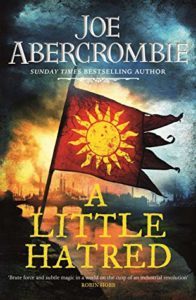 Unapologetically bleak, twisty plot twists, uncompromising violence, gallows humor, painfully awkward and deliciously sexy romance, characters with distinct voices, fucking bonkers imagery and of course, the gritty battle sequences. No one writes a battle quite like Lord Grimdark. The reality of the battles, the hacking and slashing, the emotional investment, the palpable energy that radiates throughout. There is a shit ton of blood that gets spilled between the pages of this book and it is glorious!
Unapologetically bleak, twisty plot twists, uncompromising violence, gallows humor, painfully awkward and deliciously sexy romance, characters with distinct voices, fucking bonkers imagery and of course, the gritty battle sequences. No one writes a battle quite like Lord Grimdark. The reality of the battles, the hacking and slashing, the emotional investment, the palpable energy that radiates throughout. There is a shit ton of blood that gets spilled between the pages of this book and it is glorious!
GdM Review: Click here
Blurb: The chimneys of industry rise over Adua and the world seethes with new opportunities. But old scores run deep as ever.
On the blood-soaked borders of Angland, Leo dan Brock struggles to win fame on the battlefield, and defeat the marauding armies of Stour Nightfall. He hopes for help from the crown. But King Jezal’s son, the feckless Prince Orso, is a man who specializes in disappointments.
Savine dan Glokta – socialite, investor, and daughter of the most feared man in the Union – plans to claw her way to the top of the slag-heap of society by any means necessary. But the slums boil over with a rage that all the money in the world cannot control.
The age of the machine dawns, but the age of magic refuses to die. With the help of the mad hillwoman Isern-i-Phail, Rikke struggles to control the blessing, or the curse, of the Long Eye. Glimpsing the future is one thing, but with the guiding hand of the First of the Magi still pulling the strings, changing it will be quite another…
Master of Sorrows by Justin Travis Call
Elizabeth Tabler best fantasy books of 2019
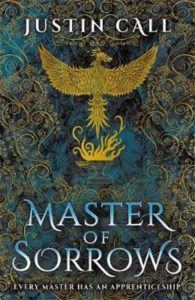 My favorite was Justin Travis Call’s book, Master of Sorrows. Justin managed to take a fantasy trope, the hero’s journey, and turn it into something fresh and interesting. The entire book was engaging and kept me up late into the night reading.
My favorite was Justin Travis Call’s book, Master of Sorrows. Justin managed to take a fantasy trope, the hero’s journey, and turn it into something fresh and interesting. The entire book was engaging and kept me up late into the night reading.
GdM Review: Click here | Lost Chapters: Click here
Blurb: You have heard the story before – of a young boy, orphaned through tragic circumstances, raised by a wise old man, who comes to a fuller knowledge of his magic and uses it to fight the great evil that threatens his world.
But what if the boy hero and the malevolent, threatening taint were one and the same?
What if the boy slowly came to realize he was the reincarnation of an evil god? Would he save the world . . . or destroy it?
Among the Academy’s warrior-thieves, Annev de Breth is an outlier. Unlike his classmates who were stolen as infants from the capital city, Annev was born in the small village of Chaenbalu, was believed to be executed, and then unknowingly raised by his parents’ killers.
Seventeen years later, Annev struggles with the burdens of a forbidden magic, a forgotten heritage, and a secret deformity. When he is subsequently caught between the warring ideologies of his priestly mentor and the Academy’s masters, he must choose between forfeiting his promising future at the Academy or betraying his closest friends. Each decision leads to a deeper dilemma, until Annev finds himself pressed into a quest he does not wish to fulfil.
Will he finally embrace the doctrine of his tutors, murder a stranger, and abandon his mentor? Or will he accept the more difficult truth of who he is . . . and the darker truth of what he may become . . .

Never Die by Rob J. Hayes
Chris Haught best fantasy books of 2019
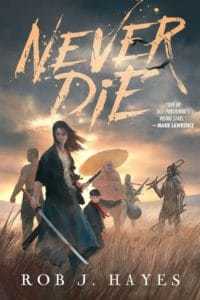 Never Die – Rob J. Hayes. Brilliant stand alone in a great 2019 market for grimdark choices. These characters stuck with me through the story and beyond, and the way the narrative was all tied together was a work of art.
Never Die – Rob J. Hayes. Brilliant stand alone in a great 2019 market for grimdark choices. These characters stuck with me through the story and beyond, and the way the narrative was all tied together was a work of art.
GdM Review: Click here
Blurb: Ein is on a mission from God. A God of Death.
Time is up for the Emperor of Ten Kings and it falls to a murdered eight year old boy to render the judgement of a God. Ein knows he can’t do it alone, but the empire is rife with heroes. The only problem; in order to serve, they must first die.
Ein has four legendary heroes in mind, names from story books read to him by his father. Now he must find them and kill them, so he can bring them back to fight the Reaper’s war.
Smoke and Stone by Michael R. Fletcher
Nate Aubin best fantasy books of 2019
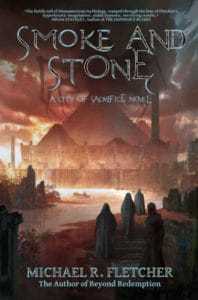 Fletcher knocked it out of the park once more with one of the grimmest, darkest, and most genuinely original novels I’ve read in a long time. Smoke and stone has hungry gods, drug-based sorcerery, and a post-apocalyptic city hewn from a single, seamless piece of stone. Even among the killer lineup of 2019 releases, this book shines with creative madness.
Fletcher knocked it out of the park once more with one of the grimmest, darkest, and most genuinely original novels I’ve read in a long time. Smoke and stone has hungry gods, drug-based sorcerery, and a post-apocalyptic city hewn from a single, seamless piece of stone. Even among the killer lineup of 2019 releases, this book shines with creative madness.
GdM Review: Click here | Excerpt: Click here
Blurb: After a cataclysmic war of the gods, the last of humanity huddles in Bastion, a colossal ringed city. Beyond the outermost wall lies endless desert haunted by the souls of all the world’s dead.
Trapped in a rigid caste system, Nuru, a young street sorcerer, lives in the outer ring. She dreams of escape and freedom. When something contacts her from beyond the wall, she risks everything and leaps at the opportunity. Mother Death, a banished god seeking to reclaim her place in Bastion’s patchwork pantheon, has found her way back into the city.
Akachi, born to the wealth and splendour of Bastion’s inner rings, is a priest of Cloud Serpent, Lord of the Hunt. A temple-trained sorcerer, he is tasked with bringing peace to the troublesome outer ring. Drawn into a dark and violent world of assassins, gangs, and street sorcerers, he battles the spreading influence of Mother Death in a desperate attempt to save Bastion.
The gods are once again at war.
The Monster of Elendhaven by Jennifer Giesbrecht
Mike Myers best fantasy books of 2019
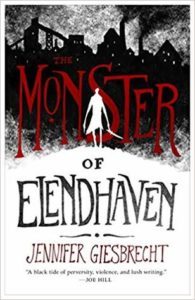 My favorite book of 2019 is The Monster of Elendhaven by Jennifer Giesbrecht. It is a dark fantasy thriller with plagues and monsters and evil people and a beautifully rendered nasty setting, but in Giesbrecht’s deft hands, it’s also a compelling, psychologically gripping tale of lust and revenge, told in parallel, twisting narratives that ingeniously leave the reader sympathizing with the most horrible people imaginable. I recommend The Monster of Elendhaven to anyone who likes dark fantasy and horror, as well as anyone who is interested in reading a brilliant character portrayal of a sympathetic yet horrifying anti-hero. Though it has a few perplexing moments, and perhaps that’s part of its charm, I absolutely loved it, and I look forward to seeing what Giesbrecht does next.
My favorite book of 2019 is The Monster of Elendhaven by Jennifer Giesbrecht. It is a dark fantasy thriller with plagues and monsters and evil people and a beautifully rendered nasty setting, but in Giesbrecht’s deft hands, it’s also a compelling, psychologically gripping tale of lust and revenge, told in parallel, twisting narratives that ingeniously leave the reader sympathizing with the most horrible people imaginable. I recommend The Monster of Elendhaven to anyone who likes dark fantasy and horror, as well as anyone who is interested in reading a brilliant character portrayal of a sympathetic yet horrifying anti-hero. Though it has a few perplexing moments, and perhaps that’s part of its charm, I absolutely loved it, and I look forward to seeing what Giesbrecht does next.
GdM review: Click here
Blurb: The city of Elendhaven sulks on the edge of the ocean. Wracked by plague, abandoned by the South, stripped of industry and left to die. But not everything dies so easily. A thing without a name stalks the city, a thing shaped like a man, with a dark heart and long pale fingers yearning to wrap around throats. A monster who cannot die. His frail master sends him out on errands, twisting him with magic, crafting a plan too cruel to name, while the monster’s heart grows fonder and colder and more cunning.
These monsters of Elendhaven will have their revenge on everyone who wronged the city, even if they have to burn the world to do it.
The Deathless by Peter Newman
James Tivendale best fantasy books of 2019
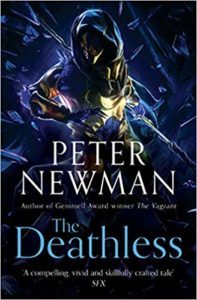 One of the most developed, unique, and thrilling fantasy series currently being written. This is highly recommended to all grimdark and dark fantasy readers, and anyone who enjoys political or horror-tinged fantasy drama. There is something strikingly original about these books and when the next entry is released I will drop everything else and read it as quick as is possible.
One of the most developed, unique, and thrilling fantasy series currently being written. This is highly recommended to all grimdark and dark fantasy readers, and anyone who enjoys political or horror-tinged fantasy drama. There is something strikingly original about these books and when the next entry is released I will drop everything else and read it as quick as is possible.
Blurb: From the Gemmell Award-winning author of THE VAGRANT, a thrilling new series of power, intrigue, and magic. THE DEMONS Creatures lurk in the endless forests of the Wild, plucking victims from those who scratch a living by the sides of the great Godroads, paths of crystal which provide refuge from the infernal tide. THE DEATHLESS Humanitys protectors reign within crystal castles held aloft on magical currents seven timeless royal families, born and reborn into flawless bodies. As immortal as the precious stones from which they take their names, they fight to hold the Wild at bay. For generations a fragile balance has held. AND THE DAMNED House Sapphire, one of the ancient Deathless families, is riven by suspicion and grief. Their hunting expeditions against the Wild are failing and entire villages have begun to disappear.Then, when assassins strike, House Sapphire shatters. NOTHING LASTS FOREVER
The House of Sacrifice by Anna Smith-Spark
Adrian Collins best fantasy books of 2019
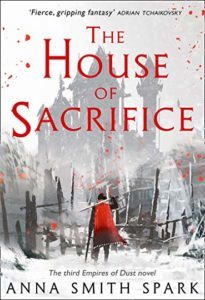 The House of Sacrifice was an unbelievable ending to the Empires of Dust trilogy. It was an experience that left me exhausted and satisfied by the end. Smith-Spark’s writing style is one of the most unique and exhilarating in recent memory and the tragedy of her characters is something I’ll savour for a long, long time.
The House of Sacrifice was an unbelievable ending to the Empires of Dust trilogy. It was an experience that left me exhausted and satisfied by the end. Smith-Spark’s writing style is one of the most unique and exhilarating in recent memory and the tragedy of her characters is something I’ll savour for a long, long time.
GdM review: Click here | Excerpt: Click here
Blurb: Marith Altrersyr has won. He cut a path of blood and vengeance and needless violence around the world and now he rules. It is time for Marith to put down his sword, to send home his armies, to grow a beard and become fat. It is time to look to his own house, and to produce an heir. The King of Death must now learn to live.
But some things cannot be learnt.
The spoils of war turn to ash in the mouths of the Amrath Army and soon they are on the move again. But Marith, lord of lies, dragon-killer, father-killer, has begun to falter and his mind decays. How long can a warlord rotting from within continue to win?
As the Army marches on to Sorlost, Thalia’s thoughts turn to home and to the future: a life grows inside her and it is a precious thing – but it grows weak.
Why must the sins of the father curse the child?
That wraps out Best fantasy books of 2019. Make sure to keep an eye out for the SFF books our team is most looking forward to in 2020 to start building that TBR to even more ridiculous levels!
The post Best fantasy books of 2019: the Grimdark Magazine team favourites appeared first on Grimdark Magazine.
December 22, 2019
REVIEW: Red Dead Redemption 2
Red Dead Redemption 2; a game that will consume you, make you laugh, bring tears to your eyes, make you a dab hand at poker, and change the way you say ‘boy’ for the rest of your life.
“Woah, boah.”
Red Dead Redemption 2 (RDR2) is game-making in it’s finest form. Set prior to Rockstar’s Red Dead Redemption, RDR2 tells the story of Arthur Morgan, a member of Dutch van Der Linde’s crew as they fight for survival in the ever-changing world of the west. The time of outlaws is drawing to a close and the van Der Linde gang is trying to find a way out. One last heist, one last big money scheme and they can live happily ever after away from the Pinkerton Detective Agency pursuing them.

Arthur Morgan is one of gaming’s best characters. Iconic like Kratos, gritty like Marcus Felix and tough like Geralt, Arthur will quickly capture your senses with his one-liners, no-nonsense approach and witty remarks. The voice acting of Arthur, alongside every single character in this game is immense. Truly immense. Each scene is film worthy, every line delivered to perfection and it all adds to the realism of a game that has pulled at my heart-strings.
“‘Careful not to work yourself to death there uncle’
‘I was thinking…’
‘Does it pay well?’
‘Eventually.’
‘So, while the rest of us are busy, killing, stealing, lying, trying to stay alive…you get too think all day.’”
The realism is something that you have to take your (cowboy) hat off to Rockstar Studio for. The breath in the snow and the beard growth and the footprints in the snow and the sway of the trees and the horses testicles (THEY SHRINK IN COLD WEATHER). You might not go into this game thinking about those kind of details but they quickly ease your rapid fall into RDR2’s arms.

As a horse owner I love this game even more. The depth of detail they have added into the game is perfection. With the breeds of horses, to the colours, to the saddles, everything down to brushing your horse and the levels of bonding. I fear no game will ever be able to top this level of authenticity. That goes for all of the wildlife, and pretty much every single aspect of this game. I have spent hundreds of hours just riding across the lush country, atop my dark Andalusian, Achilles, or my white Arabian, Luna, or my American Paint, Rain. I created bonds with these animals that left me in tears and made me proud every time we rode into a camp of rival outlaws and slickly gunned them down.
“‘Calm down.’
‘You better sleep with your eyes open.’
‘Yeah? Well you’re gonna sleep with your chest open if you ain’t careful boy.’”
There are plenty of gunslinger moments, from the classic RDR duels, to dead-eye, to large scale assaults and roadside-robberies. The choices are endless, and if you want to be a ‘bad’ Arthur then you will most likely kill everything and everyone in your path. I admit, I did this on my first play through. It was fun. Going back to the beginning and being the ‘good’ Arthur, choosing to help suck venom out of a man’s leg after being bitten by a snake rather than killing him and stealing all he had, letting people live, helping those in need. This actually yielded a far more enjoyable experience, satisfying as well as rewarding. The story is tailored to Arthur’s honour rating, and I recommend experimenting with these play styles. It isn’t just good or bad either, there is a wide spectrum and Rockstar have created so much choice within the game.
I could write thousands more words about this game. I loved it. Adored it. The clothes, characters, guns, towns, games, wildlife and challenges. The herds of horses, rival gangs, alligators in swamps, Revenant-style bear attacks, customisation of weapons, quirky side-missions and hairstyles complete this game and make it an absolutely perfect experience.
“I gave you all I had.”
5/5 – One of the greatest games that will ever be, without a doubt. A wonderful spectacle with intense gun-play, an intense story, detail you didn’t think possible, and the complete urge to get yourself a six-shooter and a ranch to shoot bottles in. RDR2 is a masterpiece that gets better each time you play, and will make you feel every emotion under the sun. Enjoy cowpokes, and always be yourself. Unless you can be Arthur Morgan. Always be Arthur Morgan.
Buy Red Dead Redemption 2
The post REVIEW: Red Dead Redemption 2 appeared first on Grimdark Magazine.
December 20, 2019
REVIEW: Shattered Dreams by Ulff Lehmann
Shattered Dreams is a rare find and one that I’m very pleased to have stumbled upon. One of the things that makes grimdark what it is, is the most simple of things: it makes war ugly. A very pretty and misleading depiction of war is shown in the vast majority of fantasy novels. Good guys win, bad guys lose, and the only people who suffer are the peasants that you see fleeing from burning villages but never really engage with. What makes people like George R.R. Martin, Joe Abercrombie, and Mark Lawrence great is their willingness to explore the horrific side of things. Innocent people are caught up in the struggle, good guys die, bad guys win, and sometimes the results are inconclusive.
 Ulff Lehmann is one of the many indie fantasy authors that I discovered while trying to get a handle on this “grimdark” thing. Like M.L Spencer, Ron J. Hayes, Allan Batchelder, and Richard Nell–he is one of the voices I think deserving to be watched in the future. He has managed to create a series that encapsulates a lot of the dark, gritty, uncompromising, and ugly sides of war. Shattered Hopes is a work that is just the first part of a larger multi-book saga but I’ve already read three and enjoyed every one of them. It has a few minor flaws but this is a small thing to the greater whole and I’m only reviewing the first book anyway.
Ulff Lehmann is one of the many indie fantasy authors that I discovered while trying to get a handle on this “grimdark” thing. Like M.L Spencer, Ron J. Hayes, Allan Batchelder, and Richard Nell–he is one of the voices I think deserving to be watched in the future. He has managed to create a series that encapsulates a lot of the dark, gritty, uncompromising, and ugly sides of war. Shattered Hopes is a work that is just the first part of a larger multi-book saga but I’ve already read three and enjoyed every one of them. It has a few minor flaws but this is a small thing to the greater whole and I’m only reviewing the first book anyway.
Shattered Dreams is an entertaining dark low fantasy novel about a Germanic kingdom under siege by an invading army, a religious cult devoted to the god of war, traumatized veterans, an elven wizard, and a talking squirrel. The fact this has a talking squirrel and this is still one of the grittier fantasy novels I’ve read since A Game of Thrones. Indeed, despite the elven sections having high fantasy magic, the majority of the setting is a dark lawless world where life is cheap. Eventually, it becomes about a siege, a conspiracy, and a book which can end the world.
My favorite character is Dragnar, who is a veteran traumatized by his experiences and driven to the point of suicide attempts. He makes an unlikely hero but events shift around him that links his personal tragedies to the larger threats in the kingdom. None of the characters are actually all that heroic, though, as they’re all driven by various motives ranging from religious fanaticism to trying to make a last meaningful accomplishment before they are too old to fight.
Generally, the best part of this book are the parts which deal with the grizzled old veterans of the story like the Chosen, Riders, and Dragnar. This is the area where Ulff Lehmann’s writing shines. He’s also very good at building believable religions and conflicts with elaborate histories alluded to without indulging in unnecessary exposition. I’m less impressed by his handling of less experienced characters because it’s clear he’s more comfortable writing hardened cynical types over the more naive or idealistic.
The world-building is very well done with a “show, don’t tell” sort of attitude. The only flaw I can really state about it is one that will show up in later books that he doesn’t take much time to reintroduce elements that he’s already made. If you lose track of his exceptionally large cast, approaching George R.R. Martin-esque levels, then good luck figuring out who is on first. There’s a few silly elements to counterbalance the dark but even they can be used to disarming effect on the reader. I never thought I’d mourn one ridiculous character as much as I did.
In conclusion, I think Ulff Lehmann’s Light in the Dark series is a good pick me up for grimdark fans looking for a new series to enrich their reading with. It is hard, cynical, and well-written with lots of well-researched battle scenes. Medieval warfare was horrifying rather than glorious and Ulff manages to capture that well. He also manages to capture a human story in a dark and unflinching conflict.
Buy Shattered Dreams by Ulff Lehmann
The post REVIEW: Shattered Dreams by Ulff Lehmann appeared first on Grimdark Magazine.
December 18, 2019
ANNOUNCEMENT: GdM to publish noir SF collection Neon Leviathan by T.R. Napper
The Grimdark Magazine team is excited to announce the February 2020 publication our first single-author noir science fiction collection, Neon Leviathan by T.R. Napper. We’re even more excited to have had this exciting new release blurbed by Altered Carbon author Richard K. Morgan (US Del Rey, UK Gollancz, Netflix).

Neon Leviathan is a collection of stories about the outsiders—the criminals, the soldiers, the addicts, the mathematicians, the gamblers and the cage fighters, the refugees and the rebels. From the battlefield to alternate realities to the mean streets of the dark city, we walk in the shoes of those who struggle to survive in a neon-saturated, tech-noir future.
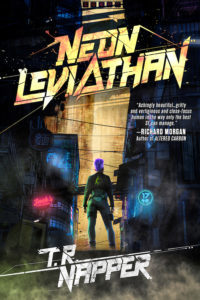 Twelve hard-edged stories from the dark, often violent, sometimes strange heart of cyberpunk, this collection—as with all the best science fiction—is an exploration of who we are now. In the tradition of Dashiell Hammett, Philip K Dick, and David Mitchell, Neon Leviathan is a remarkable debut collection from a breakout new author.
Twelve hard-edged stories from the dark, often violent, sometimes strange heart of cyberpunk, this collection—as with all the best science fiction—is an exploration of who we are now. In the tradition of Dashiell Hammett, Philip K Dick, and David Mitchell, Neon Leviathan is a remarkable debut collection from a breakout new author.
For the first time, all of the pieces of T.R. Napper’s SF-noir world have been collected into one volume—Neon Leviathan forms a century-long timeline of political suppression, breath-taking technologies, pervasive corruption, and the spark of human dignity that still lights the dark.
This hardcover, paperback, and kindle release collects the author’s original fiction published over the last half-decade in Asimov’s, Interzone, Galaxy’s Edge, and in Grimdark Magazine, and two new exclusive stories.
Pre-order Neon Leviathan by T.R. Napper
Neon Leviathan will be available on Kindle, and in print and hardcover. Pre-order your copy, now. Don’t miss out on this unique voice.
Kindle available immediately, hardcover and paperback on the way!
Call for reviewers
If you run a review site, popular Goodreads profile, Instagram review page, etc, and you haven’t heard from our team or the author, give Adrian a shout through email to get your ARC pack: adrian [at] grimdarkmagazine [dot] com.
Add Neon Leviathan to your Goodreads
If Neon Leviathan sounds like it’s up your alley, make sure it’s on your Goodreads profile! Click here to add to your profile.
The post ANNOUNCEMENT: GdM to publish noir SF collection Neon Leviathan by T.R. Napper appeared first on Grimdark Magazine.
December 3, 2019
REVIEW: Odin’s Wolves by Giles Kristian
Odin’s Wolves is superb and Giles Kristian has crafted one of the best historical fiction trilogies of … well, ever. I know I rave about them, but it is totally warranted. I adore the world in which Osric Blood Eye is a part of. Even though it is grim and gritty and terrifying, there is something about the band of warriors that sail the seas that gives me a warm feeling, and finishing this book left me feeling like I was desperate for more.
‘The blade gets dull if we don’t use it.’
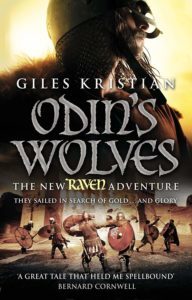 It is rare to find a trilogy that has such supreme pacing that leaves you begging for more. Raven is a trio of books that definitely makes you crave for more of the tale, and leaves an opening for more. The sheer variety of set-pieces and content of each of these books covers nearly every aspect of dark-ages adventure that you could hope for. And Giles Kristian does it so well.
It is rare to find a trilogy that has such supreme pacing that leaves you begging for more. Raven is a trio of books that definitely makes you crave for more of the tale, and leaves an opening for more. The sheer variety of set-pieces and content of each of these books covers nearly every aspect of dark-ages adventure that you could hope for. And Giles Kristian does it so well.
Odin’s Wolves pushes Osric into territories he has never been before. The adventure leads him through the seas escaping from Frankia. After meeting the iconic character Charlemagne, Kristian then writes the iconic places of Rome and Miklagard i.e Constantinople. The beauty and wonder of these places told through Osric’s eyes (or his non-blood eye) was written in an astounding way, making me wish I was shoulder-to-shoulder with Sigurd’s crew, experiencing the amphitheater and the duels, the Greek churches and the dragon-ships.
‘A wise guest knows when to leave the table.’
The crew added so much to Odin’s Wolves. The development of their relationships with Osric felt real and pure, some that bonded with him like brothers and others that thought of him as the bad luck of their Jarl. There are rivalries and bonds that are tested, strengthened, destroyed throughout this and you feel every emotion with Raven.
The realism is one of my favourite aspects of Odin’s Wolves. From the differences of cultures between the characters, to the details into the ships, equipment and mythologies, this was a Norse book through and through. I enjoyed it so much that I have been on a rowing machine in my Viking re-enactment kit. (It feels amazing. Toggle-boots, Thor’s hammer, hand-axe, I recommend this.) I can’t wait to dive into the books focused on Sigurd. He is a remarkable character, much akin to Bernard Cornwell’s Arthur, only with a longer beard and less prayer.
‘Glory is the prize that can never be burned, stolen by anyone or lost.’
5/5 – Beautiful, violent, intense and real. Odin’s Wolves is the final tale in a trilogy that will cement itself into your top 5 — easy (check out Ed’s reviews for Blood Eye and Sons of Thunder). A masterclass in pacing, character development and dark-ages realism, Odin’s Wolves is historical fiction at it’s finest. Skål to Giles Kristian!
Buy Odin’s Wolves by Giles Kristian
The post REVIEW: Odin’s Wolves by Giles Kristian appeared first on Grimdark Magazine.
December 1, 2019
REVIEW: Steel, Blood, and Fire by Allan Bachelder
I like my fantasy pitch black and unapologetically adult. It’s a subgenre that has favored stalwart artists like Joe Abercrombie, Mark Lawrence, and Richard K. Morgan. It has also provided opportunities for newcomers like M.L. Spencer, Rob J. Hayes, and Richard Nell. Now a new name can be added to the latter with Allan Batchelder’s Steel, Blood, and Fire.
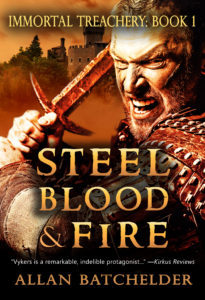 Steel, Blood, and Fire is about a Conan: The Barbarian-esque hero who gets hired by a corrupt old queen to take down a genocidal warlord whose armies are marching through her lands like a swarm of locusts. No one in this trio is a good person but whoever brings the conflict to an end swiftest will get to bear the mantle of hero.
Steel, Blood, and Fire is about a Conan: The Barbarian-esque hero who gets hired by a corrupt old queen to take down a genocidal warlord whose armies are marching through her lands like a swarm of locusts. No one in this trio is a good person but whoever brings the conflict to an end swiftest will get to bear the mantle of hero.
Vylers is a once-great warrior who is a little past his prime and only going to go downhill from here. It’s a sorry fate for a warrior and he is less than pleased about it. However, younger heroes and villains have risen that threaten to dwarf his legend. One of these is the “End of All Things” who is a madman possessed of mystical powers that allows him to ravage across the land, recruiting the survivors into his ever-growing army.
The End of All Things has no desire other than to plunder and forge an ever greater brutal legend for himself. Vykers is no saint and is more confused at this genocidal campaign than repulsed but finds himself recruited by the “Virgin Queen” (a bitter old crone) to eliminate him–because what else is he going to do with his remaining years? It helps that he has a ghost in his head forcing him to act to his quest (or he will lose the one thing he has left: his fighting prowess).
This is not a book primarily centered about Vykers, though, but a story told from multiple points of view in a fantasy war. The End of All Things is a somewhat one-dimensional madman but everyone else is kind of an asshole too. Vykers is more Logen Nine Fingers than heroic paladin but there’s an entire company of peasant warriors just trying to survive the war and make a bit of money on the side. I’m also a fan of Aoife as a young nun-like witch is forced from one trauma to another due to the evil afflicting her brother.
Allan Batchelder is a master of combining the hilarious with the horrifying. One of the earliest scenes in the book is a young boy being told he’s the Chosen One in order for the aforementioned peasants to impress him and send him off to the war. They’re terrible at it but their mark is dumber than a sackfull of rats. Hypocrisy and greed are the primary attributes of his characters and it just makes them all the more enjoyable.
I’m a fan of the characters who manage to be distinct and entertaining throughout. The mercenaries are a bumbling band of fools who are, probably, going to get themselves killed but that isn’t something they worry about since they might get paid before it happens. Vykers is also an arrogant blowhard who, despite suffering recent injuries, is eager to get back to doing the very things which got him in trouble in the first place. He’s also stuck with a moralizing ghost in his head which doesn’t want to share his form when he goes whoring about. Arune is wise but frequently exasperated with his barbarian “partner.” I’m also a fan of Aoife as a young nun-like witch is forced from one trauma to another due to the evil afflicting her brother.
The world-building is consistent but minimalist. This book doesn’t waste time with descriptions of ancient histories, Gondor’s relationships with Numenor, and other tidbits. Instead, we meet the queen, we meet her rivals, and we find out about ancient lost cities when they need to be visiting. This isn’t a bad thing, though, because the world maintains some mystery and it has enough character so as not to be a generic setting either. The book has a lot of show, don’t tell, which I appreciated. We get insight into how the people live by having characters talk about it and that works far better than trying to describe the details. It’s a dirty, smelly, sleazy sort of kingdom and that comes across through the characters.
The action in the book is great with the fights being quick, brutal, and unromantic. Vykers is reputed to be a legendary warrior who could kill two hundred men but he’s “only” able to kill about six at a time. There’s a sort of Howardian feel to things that is mixed with an unromantic working class sensibility to the heroes. One of them is a gigolo, for example, and he discusses (at length) how his business works in a Medieval fantasy world. Magic is shown to be useful but not overwhelming, allowing armies and regular warriors to be relevant.
In conclusion, this book is just fun and I’m eager to read the rest of the books in the series. The humor, action, and cynical world are all things which made it an enjoyable reading experience. People should definitely check this out as a great example of indie grimdark. You won’t regret picking it up.
Buy Steel, Blood and Fire by Allan Batchelder
The post REVIEW: Steel, Blood, and Fire by Allan Bachelder appeared first on Grimdark Magazine.
November 29, 2019
EXCERPT: Violya by Rosalyn Kelly
After enjoying Melokai (review | excerpt) by Rosalyn Kelly so much, we were keen as mustard to get a hold of book 2 in the In the Heart of the Mountains series. And while our team is working on a review of the book, the author was swish enough to give us chapter one of Violya and we are really excited to share it with you!
Violya
Chapter 1
“Cockfaces,” the warrior Violya hissed as the enemy’s ramshackle camp came into view.
In the dead of night, lit only by the camp’s pathetic fires that spat and sizzled against the heavy snowfall, a small, deadly force of one hundred Peqkian warriors and one hundred Jute fighters silently climbed down the mountain slope.
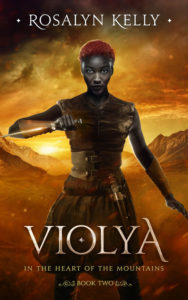 The winding trail wasn’t an option. Now plugged with deep snow, it was being watched by twitchy desert cammers, posted on the perimeter while their comrades slept. The soldiers huddled together, shivering violently. Misshapen, ugly humps poked out of thin, wretched uniforms not suitable for the cold weather.
The winding trail wasn’t an option. Now plugged with deep snow, it was being watched by twitchy desert cammers, posted on the perimeter while their comrades slept. The soldiers huddled together, shivering violently. Misshapen, ugly humps poked out of thin, wretched uniforms not suitable for the cold weather.
The cammer soldiers eyed the rocky incline and the trail which they’d come from, surveying the dark, ominous hunks of jagged rock and looming boulders. The dwindling flames cast long shadows, and heads jerked at any hint of movement. Their white-knuckled, trembling hands gripped their swords. As if their weapons would save them.
Every now and then they glanced desperately at the start of the snaking path that led down the southern slopes and across the wastelands. A four-day trek away was the border to their own miserable sand-choked nation. But they hadn’t made it to the dunes in time.
V had caught up to them. And now they would pay.
The Dromedars were crammed in the middle of a large, flat area of the mountains that jutted out with a sharp cliff below. In the shadows of the huge boulders, where this level expanse met the mountain slope, V eased herself gently from the rocks, meticulously placing one foot then the next in the snow.
Having left their bulky fur coats, gloves and movement-hindering wrappings back at their camp with the animals, the Peqkians and Jutes deftly landed around her.
“Tents,” the warrior Lizya whispered to V. “First we’ve seen.”
In the midst of the camp were seven small tents for the important cammers, the animal hide sagging under the settling snow. For three weeks V’s small force had driven the hump-backed invaders out of the capital, out of the country, nipped and harried at their heels, and picked off the stragglers. These one thousand soldiers were the last dregs of the Dromedar army that remained in Peqkya.
“The male-child cammer has to be here,” V said.
She itched to finish him. In a moment of uncharacteristic emotion back in Riaow, she’d had the chance to slice the zhaq Crown Prince of Drome in two but she’d toyed with him, wanted to torture him for what he’d done, for who he’d murdered. But he’d got away, minus his arms, and she was racked with guilt that gnawed at her. The regret strangled her every thought, like ivy twisting around a tree.
Foolish mistake, warrior, V berated herself again. But he was here. He had to be. And she’d have her vengeance.
The magic in V’s blood pulsed in her ears.
Oh, use me, use me, use meee! We’ll wreak devastation bigger than the world has ever seen… a rain of rocks to crush their cammer bodies… a flood of epic proportions to drown them all… a surge of wind to shove them over the edge of the cliff… a…
Be quiet, V snapped, we have a plan. The magic retreated, simmering in her veins. Her long-repressed power had erupted during the battle in Riaow but had been silent since. She would learn how to master it from the Stone Prophetess Sybilya, but until then, she couldn’t risk using it and unleashing more harm than good.
The Jutes formed into tight rows, their copious weapons on show: blades of all sizes, throwing stars and axes. The pink-skinned, intricately inked creatures from the rainforest realm of Majute stood no taller than V’s belly. Their small frames barely dented the calf-high snow.
V and her warriors shifted behind, soundlessly drawing their swords. The crackling fires and fitful hum of snoring cammers the only noise.
In the gloom, the Jute captain Brinjinqa bowed low to her, his blue hair fashioned into spikes just missing her hands.
“My dear, V,” Brin said with a twinkle in his black beady eyes that always seemed to be looking everywhere at once, “we thank you for the opportunity to use this.” He held up the vial of red liquid that hung around his neck and chuckled to himself.
Ridiculously strong pitfire juice, he’d called it. Pitfire was a crop grown in Majute. She’d first seen it when she’d ventured there leading a Peqkian trading party. When boiled and prepared as a drink it was as potent as wine or poppy.
It was a risk.
The Jutes hadn’t requested to use it until now and she had no idea what it would do. She’d only seen people drunk and lethargic on it. But the deep snow was no obstacle for the light-footed Jutes and, as her force was outnumbered, the attack required speed. She trusted Brin. His ruler had sent him and his fighters with V. They had fought bravely beside the Peqkians since the invasion and were yet to take any casualties.
Brin whispered to V, “When we slow, it’s safe to approach, as the pitfire will be wearing off. When we are in the high state, we cannot tell friend from foe, only others of our kind.”
She nodded and Brin’s large grin revealed front teeth that had been filed to sharp points.
He unstoppered the vial from around his neck and held it up to his face. One hundred Jutes did the same in complete unison. As one, each took the tiniest sip, carefully replaced the stopper, shuddered, and set off across the snow at such a speed that the Peqkians were momentarily left behind.
“Ack, ack, ack!” The Jutes’ war cry increased in volume as they got closer to the camp.
“Love those crazy little freaks,” the warrior Finya said.
Mangled shouts rose from the soldiers on guard as a sea of acking creatures smashed into them. The Jutes swirled like a tornado tossing cammers out of the way or trampling them flat to the ground. The Jute twister swept nearer and nearer to the tents on a random, jerky course, causing utter chaos.
Each individual Jute was going berserk. They slashed with knives, cleaved with claw-like hands, shredded with sharp teeth. But they moved as a whole. The mass crashed forward, a froth of frenzied fighters that blitzed a path to the tents for the Peqkians.
Throwing off sleep, cammer soldiers scrambled to their feet, unsheathed swords or jumped out of the way. All their attention focused on the progressing churn of pink bodies.
V signalled to her warriors and they charged. The snow hindered their momentum but the noisy Jutes masked the sound of their approach. They reached the edges of the camp and slew distracted cammers who fell in droves. Soldiers turned to face them and V and her warriors fought wave after wave of hump-backed Dromedars. She pushed forward to the tents, flattening anything that stood in her way, engaging without pause and storming through hastily-formed defensive lines as if they were mere blades of grass under her boots – she could not allow those under cover to escape.
This is your end Crown Prince!
Soldiers formed a muddled defence outside the tents, eyes on the Jutes who were rapidly advancing. Cammer swords came up to attack but the Jutes didn’t engage. The whirlwind surrounded the tents and formed a circular wall of moving pink-skinned, blue-haired bodies.
The Jutes who faced the tents snarled and acked, trapping the soldiers and tent inhabitants and isolating them from the rest of the camp. Those who faced outward engaged any cammer that came near. The soldiers pressed in, attempting to find a way through the berserker Jutes to save those behind.
V and her warriors blazed their way through incompetent soldiers, no match for her seasoned warriors. Desert blood drenched the mountain rocks, doused fires, splashed up her arms and spurted across her face. The tang of iron clogged her nostrils and the wet gore slid past her lips to cover her tongue and teeth in a hot, sticky film. But there was only one whose blood she longed to spill and she was almost upon him.
As her company neared the tents, the Jutes’ movements slowed. V directed her warriors to form a protective wall around the Jutes, whose chests heaved as they looked one another over checking for injuries and cuts. All were exalted, laughing, grinning and yammering to each other in their singsong language. They parted like water to allow V and twenty of her warriors through and then fluidly closed the gap.
Brin passed V as he and his Jutes continued to circle, sweeping his hand to the tents as if in offering.
“All yours, my dear,” the Jute captain said.
She thumped her fist to her chest in thanks and beckoned to her warriors.
Soldiers protected those still in the tents, swords drawn and legs quaking. A few tent occupants had joined the fight, but the one she sought was injured. He won’t have left the tent.
V whistled orders to her women and they struck the Dromedars down. When every cammer was on the ground, groaning in pain or crying out in their last moments before death, V sliced a deep gash in the side of the first tent and the warrior Daya ripped the cloth apart.
Empty.
The second contained an older cammer soldier, whimpering. The third, fourth and fifth were all empty. The sixth contained three soldiers in uniforms made of expensive cloth clutching each other.
The seventh…
Daya stared at V, and she knew.
The Crown Prince, the armless male-child Ammad, was not there. The worm had made it back to Drome.
Internally, V raged. Her magic screamed along with her, pummelled at her bones, sloshed about in her gut. She wanted to punch great holes into nearby boulders, thrash and kick. But she controlled her emotions. The expression on her face and stiffness of her stance betrayed nothing.
“Zhaq,” the novice warrior, Monya, yelled, unable to master her emotions like the older warriors. In a frenzy, she slashed the tent to shreds with her sword.
The youngblood had expressed all of their frustrations, but once done, she studied her feet.
V took a long, slow breath.
The Jutes parted as she strode from the flattened tents, tailed by her warriors. Exhausted, half-frozen cammer faces gawped at her, but cowered as she passed. Her tall stature, glowing black skin, red hair and palms the colour of poppies marked her as different from her fellow warriors and sparked fear in the Dromedars.
The soldiers had no fight left in them. They lowered their swords, rooted to the spot. Most, she noticed, had metal cuffs around their wrists. Slaves. They followed orders. And now that the important cammers in the tents – their masters – were dead, these males posed no threat.
There is no glory in a needless slaughter. Most of the cammers wouldn’t survive much longer without food and water. And she doubted the desert would be forthcoming.
In the east, the sun was starting to rise.
Her magic granted her the ability to speak in any tongue. In Dromedari, she said, “Drop your weapons.”
The soldiers obeyed without hesitation and the thump and clang of falling steel echoed across the plain. She pointed with her sword to the path that led down the mountain. “Any soldier who is still here when the sun comes up will be executed. Run.”
The soldiers nearest to her shambled towards the path, grabbing up packs and raggedy blankets as they went. Soon those further back understood what was happening and scurried behind them.
To the Jutes, V said, “Rest. You earned it.”
To her warriors, she said, “We follow them to the border. Pick off any who lag behind. Let’s get these cammer cockfaces out of our country once and for all.”
A few days later, the last of the Drome soldiers slid, stumbled and fell down the loose rock of the earthquake landslide that had first opened an entrance for them at the Peqkian border.
Clouds of dust flew up behind them. They ran as fast as their cammer legs would take them across the wasteland the earthquake had torn apart and towards the desert.
Beyond the fleeing males were vast dunes, almost mountains in themselves, and undulating red sand for as far as the eye could see.
Somewhere out there was the one she sought. The Crown Prince of Drome. Ammad. He’d murdered Melokai Ramya. His army had invaded Peqkya to claim the country as his own. And he’d been responsible for her best friend’s death. Emmya. She missed Emmya. He’d caused the deaths of so many Peqkians.
Was he alive? Until she saw him dead, she would believe it.
I will have my revenge.
After a while, Lizya touched her forearm and raised an eyebrow in question.
V turned to see her warriors poised and waiting for her order. They would follow her into Drome, into the vast desert without question. It still felt strange that she was their leader. Was responsible for her actions and the actions of many others.
She wanted to charge into the dunes, her quarry was that way. She’d hunt him down and finish him as she should’ve done when she’d had the chance.
But… There was something that needed V’s attention now more than the armless worm.
“We return to Riaow,” the red-haired warrior said. “Peqkya needs us.”
Pre-order Violya by Rosalyn Kelly
The post EXCERPT: Violya by Rosalyn Kelly appeared first on Grimdark Magazine.
November 27, 2019
The magnificent grimdark fantasy art of Dejan Delic
It’s no secret that the Grimdark Magazine team are huge fans of amazing fan art, and Serbian artist Dejan Delic is absolutely killing it. He’s hitting all the right points for dark and grimdark fantasy fans, his illustrations showcasing the amazing worlds of Anna Smith-Spark, Anna Stephens, Gareth Ryder-Hanrahan, Ed McDonald, Joe Abercrombie, and Steven Erikson.
Enough from me, check out Dejan’s work with commentary from this brilliant artist on each piece, below.
The Court of Broken Knives

The Court of Broken Knives is inspired by Smath-Spark’s main character, Marith. In this scene we see Marith dealing with the dragon, releasing some of his potential when it comes to murder abilities. Such an amazing character, considering his acts and behaviour. Not to mention Anna’s outworldly writing style. It’s inspiration itself.
Godblind

Godblind by Anna Stephens is inspired mostly of the dark tone of her first book. I’ve wanted to express the entire story in one picture, in composition made of almost all main characters. And I think it’s dark as her book.
The Gutter Prayer
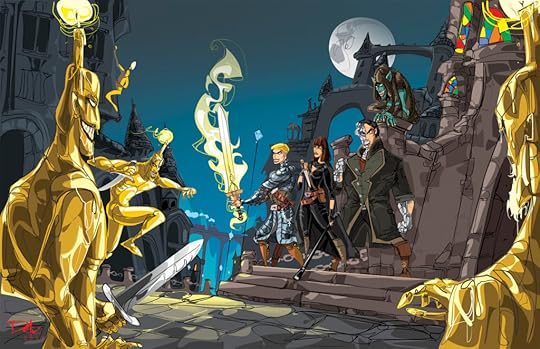
The Gutter Prayer is inspired by main characters from Gareth Hanrahan’s first book in his The Black Iron Legacy. This is such amazing and crazy series, and it’s hard to resist not to illustrate it. Can’t wait for the next sequel in the series.
Ravencry

Ravencry is inspired by main character in the series, Ryhalt Galharrow, and his dealing with Ezabeth’s absence in the second book. I wanted to present his duality between The Misery and Valengrad, and something that will change him utterly. No spoilers, of course!
Shattered Sea and Red Country
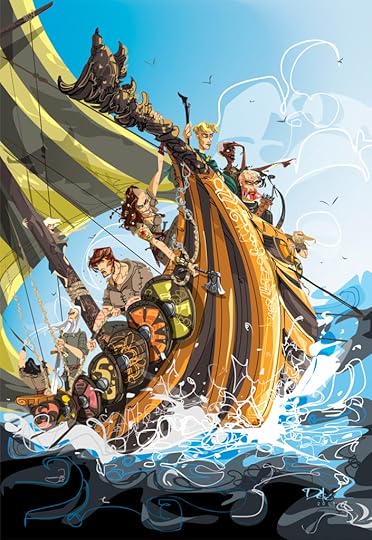

Now, Shattered Sea and Red Country are inspired by two of Joe Abercrombie’s books. In both I wanted to illustrate the very essence of it — main heroes combined all together, despite their differences and goals. And Lord Grimdark has perfect writing ability to throw the rawest and ugliest human behaviour in readers face. Gotta love it.
Malazan Book of the Fallen
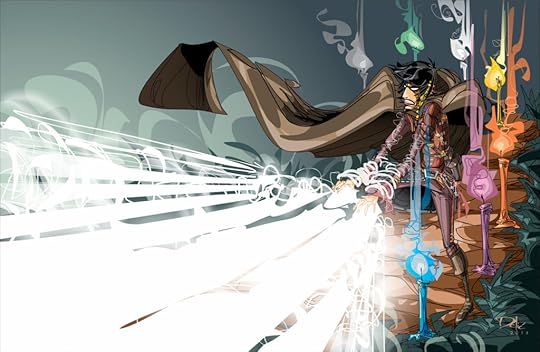
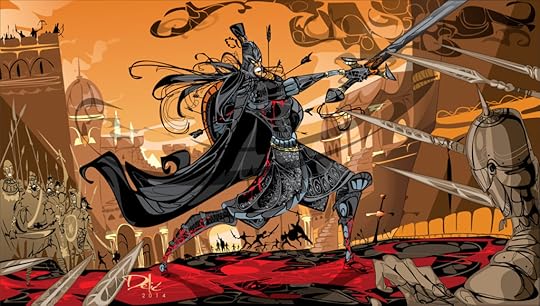
The last two illustrations Beak and Brukhalian are from my favourite series of all time — Malazan book of the Fallen. They are inspired by the human sacrifice, in attempting to save their friends no matter the cost. Erikson has the ability to touch your very soul with his writing, and his books have been one of my main inspirations for years now.
By-the-by, the last one work is Brukhalian, from Memories of Ice, by Steven Erikson.
About Dejan Delic
Dejan Delic lives in Serbia. He has a college degree in industrial design, and illustration has been the primary form of his artistic orientation for many years now. Dejan has been drawing for quite a long time, since he was little. After graduating from the design college, Dejan has dedicated himself to graphic design, comics and illustration, with illustration having come to the fore in the last seven to eight years. Since Dejan is a a great fan of epic fantasy, the most common themes in my art are concerned with this genre.
Follow Dejan on:
DeviantArt: https://www.deviantart.com/dejan-delic
Twitter: https://twitter.com/Dejan__Delic
Facebook Art Page: https://www.facebook.com/DejanDelicArtPage/?ref=aymt_homepage_panel&eid=ARBLu5P13Jb5000mf5pxsfUhSsY-hhQ-O0hLeCnyUtinINHmGrfjPjmnGHQV6wBOfBZSSQfFWyOZ-8Aa
The post The magnificent grimdark fantasy art of Dejan Delic appeared first on Grimdark Magazine.
November 24, 2019
REVIEW: Sin Eater by Mike Shel
Sin Eater, book two of Mike Shel’s Iconoclasts series, begins with an empire in decay. When a beloved monarch falls ill and priestly magic and the best physicians fail to cure her, the clergy of an obscure god of thieves and tricksters save her life. Her subjects’ joy over her renewed health is short lived, however. As the queen becomes more and more prone to bouts of violent madness, her court discovers the dark price of her recovery, and all who attempt to depose her meet violent and seemingly coincidental ends. As the queen enters the 141st year of her life, now reigning as little more than a malevolent, cannibalistic corpse, this novel follows a party of troubled adventurers striving to end her eternal tyranny and deal with their own demons in the process. (Some unavoidable spoilers for book one follow.)
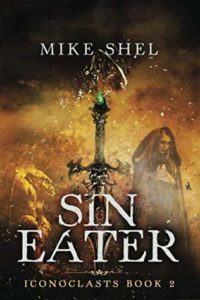 Sin Eater picks up shortly after Aching God leaves off and follows up on a pair of book one’s most tantalizing loose threads: the cursed and dangerously insane queen Geneviva and the god-slaying sword, Szaa’da’shaela. While Sir Auric Manteo (a retired swordsman coping with the loss of his wife and son and the horrific slaughter of his adventuring companions on a quest gone wrong) returns as a main character, this book shifts from his single POV in Aching God to the split perspective of him and his daughter Agnes (an up-and-coming adventurer in her own right). To a lesser extent, readers also experience occasional forays into the perspective of a mysterious old man struggling to hold the empire together while the other protagonists undertake their journey.
Sin Eater picks up shortly after Aching God leaves off and follows up on a pair of book one’s most tantalizing loose threads: the cursed and dangerously insane queen Geneviva and the god-slaying sword, Szaa’da’shaela. While Sir Auric Manteo (a retired swordsman coping with the loss of his wife and son and the horrific slaughter of his adventuring companions on a quest gone wrong) returns as a main character, this book shifts from his single POV in Aching God to the split perspective of him and his daughter Agnes (an up-and-coming adventurer in her own right). To a lesser extent, readers also experience occasional forays into the perspective of a mysterious old man struggling to hold the empire together while the other protagonists undertake their journey.
While I wasn’t expecting such a major change from the Auric-focused POV of book one, I thought seeing things from both of the Manteos’ perspectives added a lot to the narrative. Auric and Agnes’s strained relationship is a centerpiece of the novel, and experiencing it from both sides did a lot to develop the pair. I also really enjoyed Shel’s choice to throw the old man into the mix. In addition to being an enticingly mysterious character in his own right, his chapters provide a window into just how far and how fast things are devolving in the royal court and add another layer of tension to the narrative as the rest of the characters race to find a solution.
Joining Agnes and Auric is a cast of equally excellent supporting characters that make up their adventuring party. These include Chalca, a witty actor-turned-rogue, Kennah, a gruff swordsman recovering from the recent death of his dearest companion, and Queelb, a deeply traumatized sorcerer with a particularly disturbing brand of magic. The priestess Sira Edjani returns as well, and serves as the group’s healer. While it’s easy to recognize which tabletop trope each falls into, Shel does a great job of making them more than stats on a sheet. As the title suggests, Sin Eater is almost a confessional booth for its characters, gradually fleshing them out through their secrets, shames, and past traumas (some implied and some explicit). If I had one minor complaint about Shel’s characters, it would simply be that I wanted more on-the-page time getting to know a few of them who didn’t have as big a share in the limelight.
Sin Eater is a bit of a slow burn, with the main “quest” of the novel not beginning until the book is halfway over. But like the Aching God before it, I felt like the journey was just as gripping and important as the destination. The adventure’s prologue never reads like prologue, and the character and worldbuilding setup in early chapters has a fantastic payoff in the end. Between this and a few deft plot twists cunning enough to satisfy the most malevolent of trickster gods, I found this novel enthralling from start to finish.
Overall, my favorite aspect of this book and the Iconoclasts series as a whole is the way Shel takes classic tabletop adventuring tropes and thinks through their real-life consequences and implications. Violence and trauma aren’t just a bad roll on the d20 and a failed saving throw–they inflict permanent physical and mental consequences on the characters. While any work of fiction reflects the talents and interests of its creator to some degree, Shel’s time in the tabletop games industry and background in psychotherapy really shine in the pages of this book. Between that and a demonstrable mastery of tension of and dread, I’ve come to see Shel as one of indie fantasy’s finest voices.
While this book contains fewer horror elements than its predecessor, I’m confident fellow grimdark fans will enjoy its startlingly bleak worldbuilding, deep and realistically flawed characters, and its exploration and subversion of the classic fantasy adventurer archetype. Aching God set my expectations high, and Sin Eater definitely met them. In all, I’d give this book a strong 4.5 out of 5 stars. I can only hope book three comes out before my 141st birthday.
Buy Sin Eater by Mike Shel
The post REVIEW: Sin Eater by Mike Shel appeared first on Grimdark Magazine.
November 23, 2019
REVIEW: The Grey Bastards by Jonathan French
If Sons of Anarchy and Lord of the Rings had a bastard child who fought and scrapped in the muck to survive, it’d be The Grey Bastards. This brilliant mash-up of dark fantasy and motorcycle gangs is a fast-paced page-turner that’ll keep you hooked from start to finish.
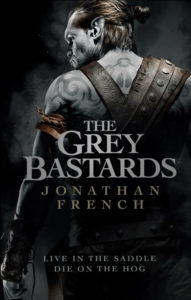 Jackal is a member of the Grey Bastards, a brotherhood gang of half-orcs riding their massive (and literal) hogs around the Lots (badlands) to defend the border of civilisation from the full-blooded orcs out to destroy it. Under their leader, the Claymaster, the Grey Bastards fight, fornicate, and give each other a constant ribbing. However, Jackal sees the Claymaster’s decisions becoming more and more damaging to his hoof (gang) and the arrival of a mysterious stranger makes him think that perhaps it’s time for a change in the Grey Bastards’ leadership.
Jackal is a member of the Grey Bastards, a brotherhood gang of half-orcs riding their massive (and literal) hogs around the Lots (badlands) to defend the border of civilisation from the full-blooded orcs out to destroy it. Under their leader, the Claymaster, the Grey Bastards fight, fornicate, and give each other a constant ribbing. However, Jackal sees the Claymaster’s decisions becoming more and more damaging to his hoof (gang) and the arrival of a mysterious stranger makes him think that perhaps it’s time for a change in the Grey Bastards’ leadership.
The Grey Bastards is a fun story full of twists and turns and betrayals. The characters very quickly grow on you, their personalities really well fleshed out by the author through consistent banter to make the victories sweeter and the defeats all that much harder to bear. The setting is frontier-style, and the world includes a broad range of beings, from humans and half-orcs, to elves and a weird creature kind of like a new aged The Blob.
All the messy details are in this book. It’s gritty and grimy as all hell, and reminded me a bit of Joe Abercrombie’s style. However, this isn’t a Grimdark book, by any stretch of the imagination—it’s more dark fantasy—but fans of grimdark will get a huge kick out of this book. I highly recommend you grab a copy and get stuck in.
“Live in the saddle! Die on the Hog!”
Buy The Grey Bastards by Jonathan French
The post REVIEW: The Grey Bastards by Jonathan French appeared first on Grimdark Magazine.








